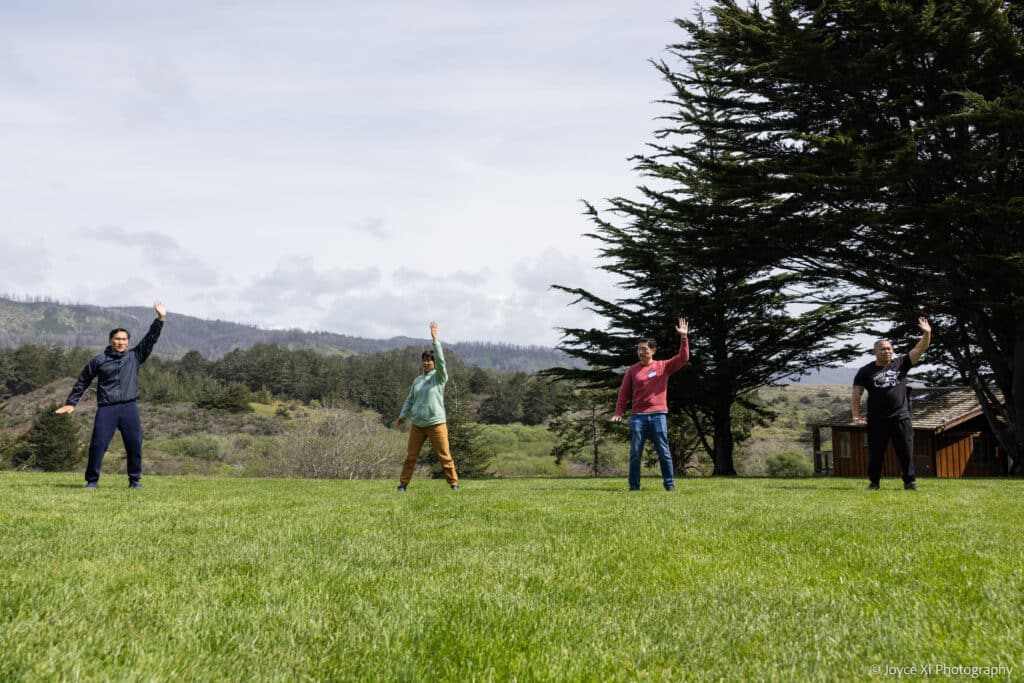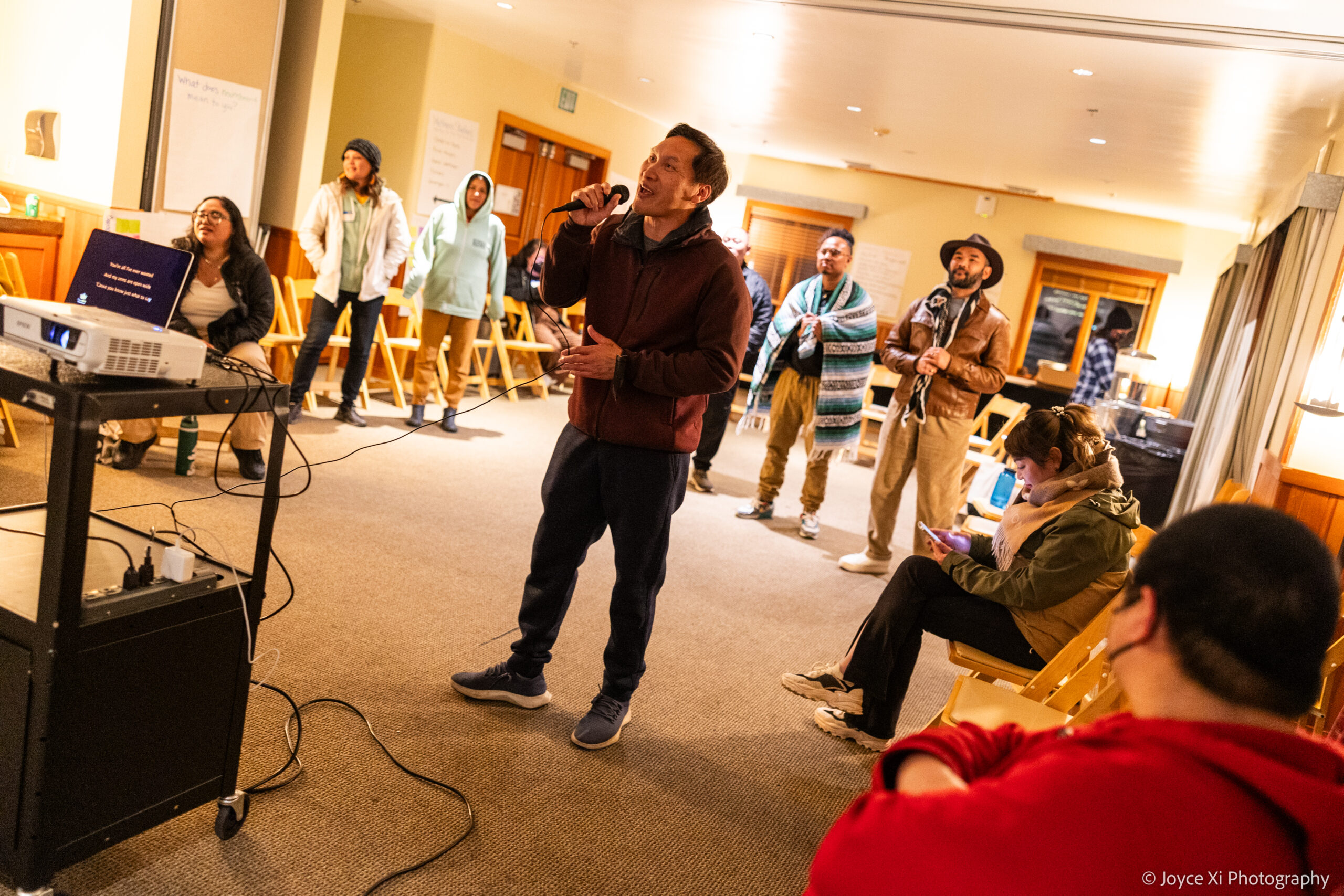This blog post is the second in a three-part series focusing on our three main values at New Breath Foundation: Collective Learning, Collective Healing, and Collective Liberation. At NBF, our definition of Collective Healing is when a group or community acknowledges and addresses shared traumas, injustices, or wounds to foster resilience, reconciliation, and mutual well-being through communal support, understanding, and transformative action.
This month, we sat down to talk about collective healing with NBF Board Member Luigi Fu. During our conversation, Luigi shared his own perspective on collective healing, particularly as a framework for nonprofit organizations and work culture within the greater movement. Luigi also shared how he witnessed and experienced collective healing at the recent NBF Grantee Convening, “Nourishing Our Leaders, Nourishing the Movement.”
NBF: Please tell us about yourself and your current work.
My name is Luigi Fu (he/him). I live on unceded Ohlone territory in Oakland, California, but I’m originally from Brooklyn, New York. I have been a Board Member at New Breath Foundation since January 2023.
For my day job, I’m a Project Director at the LeadersTrust, a national nonprofit that provides multi-year capacity-strengthening support to social justice organizations with an intersectional racial equity lens. My role in particular focuses on internal culture, equity, and knowledge.
In addition, I’m a co-founder and executive chair of a local giving circle in the Bay Area called API Giving Project. We pool funds from members who are in philanthropy, nonprofit, and the tech sector or private sector to support local AANHPI grassroots organizations across the Bay Area.
NBF: How would you define “collective healing” and “healing justice,” and how do you see these concepts fitting within the greater movement?
I really like this definition from Cara Page from Southern Healings Justice Collective: “Healing Justice is a framework that identifies how we can holistically respond to and intervene on intergenerational trauma and violence, and to bring collective practices that can impact and transform the consequences of oppression on our collective bodies, hearts, and minds.” For me, I look at healing justice as putting practices, rituals, and systems in place that see people as holistic individuals with needs outside the workplace and movement. We cannot expect people to be at their best selves when we ask them to compartmentalize who they are as human beings and ignore their basic needs. In essence, how do we care for our people and our communities and move away from extractive practices that we’ve adopted in the nonprofit sector and movement spaces over the past decade, towards one where we center people in the community we operate in?
This work reminds me of adrienne maree brown’s book Pleasure Activism. She talks about how important it is to bring joy back into our movement. For the past several decades, we have ignored the basic human need to just be happy and put joy into the work. We’ve shifted the focus to the movement itself versus the people within these movements. For me, healing justice is bringing that focus back onto the people within the movements and what they need to heal from past trauma and provide them with that spaciousness. Because oftentimes, we operate on this sense of urgency where we burn our people very quickly and say, “This needs to happen now, or else.” But we have to remind ourselves that meaningful change takes generations.
I’ve seen people leave the movement because they’ve been burnt out, especially BIPOC folks. People who come into these movements often have experienced trauma or stress or have been impacted by the very systems they’re trying to change. We need to make sure that the people within our movements—who often come from the communities we support—are not getting burned out. We need our movement to be sustainable—not just in terms of what the organizations need, but about what people need. How can we, as a movement, envision a new future, new practices, and new ways of being? Oftentimes, I’ve seen organizations and movements replicate the very systems we’re trying to fight versus trying to imagine new ones. And without that imagination, we get stuck. And it doesn’t allow us to think of new ways to operate.
NBF: You mentioned that healing justice is one of your passions. Can you share how you’ve experienced this personally?
I’ve been working in different roles in the nonprofit space for over 13 years now: fundraising, operations, volunteer and staff management, event planning, you name it. One of the reasons why I’m really invested in healing justice work is because I’ve been burnt out in the past. I actually left the nonprofit sector for a year and worked in sales at a tech firm in the Bay Area. I quickly realized that it wasn’t for me. There was no investment in my development, healing, or wellness. I saw myself more as a tool versus a human being. Once I started working at the LeadersTrust, it took some time and encouragement from fellow co-workers to help me develop as a leader and find my voice.
If we’re creating these systems and structures where BIPOC folks are getting burnt out and leaving the movement that is trying to fight for change for the very communities they came from, what does that say about our movement? If a privileged, cis heterosexual Asian-American man can easily get burnt out, what does that mean for folks who are marginalized in our societies and who work in these structures? We’re not creating a system that allows them to sustain themselves and heal. Instead, we’re saying we don’t care for them as individuals. That experience disillusioned me in the past and is why I’m passionate now about healing justice in the workplace.
NBF: You were recently at the NBF Grantee Convening, “Nourishing Our Leaders, Nourishing the Movement.” Can you share some of your highlights? What are one or two moments of the convening that embodied collective healing to you?
One of the most healing aspects of the convening was the spaciousness. I really appreciated how Claudia (Director of Programs) and Mari (Program Manager) organized and framed the retreat—not as a vacation but as an opportunity to rest, recharge, and connect with other leaders. Instead of organizing every minute, every day, they purposely built in large blocks of time for rest. I think this is really important: gathering folks in an area where they don’t have to think about the day-to-day work and have an opportunity to relax and slow down—because these leaders are doing the work day in, day out.
I saw leaders caring for themselves in different ways. One person was taking a nap during the middle of the day. Another person was water coloring. Others were doing Tai Chi with Eddy Zheng, or going for walks and taking in the views. I also witnessed some emerging collaborations and relationships between different organizations during informal gatherings, for example, meals or downtime.

The session facilitated by Kazu Haga on mindfulness, trauma, and conflict was definitely a highlight. We discussed how we, as individuals and as a community, respond to trauma and support how people heal within our organizations and movements. That session allowed me to reflect on how I deal with my own trauma and stress and think about moving beyond just coping with the situation but being resilient and thriving. It has changed how I’ve dealt with stress, even just over the past two weeks.
Another highlight was during karaoke. I’m also working on language justice practices at our organization. Historically, people who don’t speak English feel left out at these gatherings. But at the convening, NBF staff brought in interpreters so that non-English speakers could fully participate, share their stories, and feel included. And so what is the impact of that? They felt like they belonged. So, they felt comfortable singing their hearts out in Chinese during karaoke. That’s a testament to the inclusive, healing space that NBF has created.

NBF: What role do you think philanthropy can play in collective healing?
First and foremost, philanthropy should provide multi-year general operating support because, without funding, leaders can’t look to what’s ahead. Then, philanthropy should provide restricted capacity-building grants that nudge leaders to care for themselves and their staff. If you just give organizations unrestricted grants, they will focus on the work because that is most urgent and pressing. But we need specific dollars dedicated to capacity building so that leaders can work on caring for themselves and their staff, which will sustain the movement as a whole over time.
In addition, philanthropy should center collective healing in their grant practices. They could and should organize spaces for individual organizations like convenings, like what we experienced earlier this month. It takes money, time, and a network to organize these kinds of events. If you’re a smaller grassroots organization, you have none of these. It’s important that philanthropy creates these spaces for our leaders to connect but also rest. We need to build in these practices of “go slow to go fast.”

It’s also important to share resources as well. Philanthropy plays a critical role in sharing or providing resources to organizations to move their collective healing practices forward and be a part of the work. I think the session with Kazu Haga is one important example. Yes, it is important as individuals to think about how we deal with trauma internally, but how do we collectively deal with trauma and move forward together?
NBF: Anything else you would like to share?
Collective healing needs to happen at all levels, including in philanthropy. I’ve often talked to leaders in philanthropy who felt guilty about taking time off because of their relatively privileged position. And for nonprofit leaders, it’s easy to think, “I have it better than community members. Why am I taking time off? I need to constantly be vigilant and be on because the need is there.” This self-sacrificial work culture is tied to oppressive systems constructed by generations of white supremacy that we need to fight internally. But in order to make this collective change happen, there needs to be systematic change across the board, from community to nonprofits to philanthropy. We can’t fight for healing justice or collective healing without understanding what it truly means to live in it. Without that lived experience, how do you know what you’re fighting for? That’s how I try to live my life.
—
Luigi Fu is a Project Director at the LeadersTrust, supporting the organization’s culture-building practices and staff engagement strategies. He is also a co-founder and executive co-chair of API Giving project, a Bay Area giving circle focused on supporting the local AAPI community.
As an immigrant and beneficiary of public/private programs, he understands the transformative power of community support and the challenges of navigating between different spaces. He is passionate about creating accessible spaces for those often marginalized from mainstream institutions and expanding access and opportunities for everyone, no matter their background.
Luigi previously worked at New York Cares and Dream Corps. He received his B.A. in International Studies from Dickinson College and MPA from Baruch College Marxe School of Public and International Affairs. He currently lives in Oakland with his partner.
